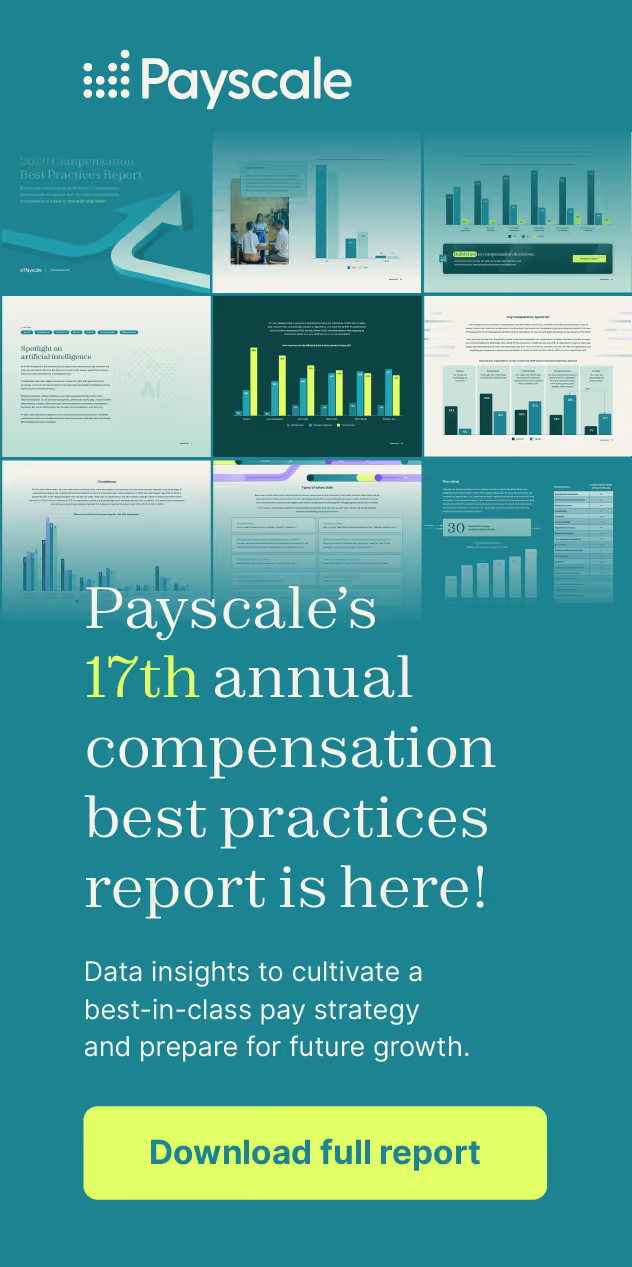Compensation strategies for a bad economy are important when a recession is looming. Many companies will modify their compensation and benefits plans during an economic recession in an effort to save money. They need to minimize costs and, hopefully, get set to recover from the recession faster than their competitors.In these times, you may have already reduced merit increases or enacted a pay freeze on raises. If you haven't made these decisions yet, you are probably wondering what are the trade-offs of cutting versus freezing pay. Would an across the board pay-cut make sense or would it hurt certain key performers too much? Would layoffs be wiser?Let’s take a look at how the economic crisis has impacted compensation, and how you can maintain a pay-for-performance culture in recessionary times.
How Do Recessions Affect Compensation and Merit Increases?
Having real-time, accurate, market salary data sets yourself apart as an employer. Pay a fair wage and also stay in budget. Try a demo of PayScale MarketRate and see the benefits of comprehensive salary data.
In the last recession of 2007-2009, according to a survey by WorldatWork, 1,000 U.S. companies surveyed gave a lower amount for pay increases in 2009 than they expected to. Instead of their planned pay-raises of 3.9 percent, they actually gave merit increases of about 2.1 percent.Considering that inflation was virtually zero in 2009, an average merit increase of 2.1 percent is still not insignificant, and it means that some people were given a decent bump in pay, despite the economic crisis. Hopefully, those people were the companies’ top performers. The reason you want to give employees raises is to keep them on staff. It's still important to recognize employees’ growing abilities. Employees who have grown are worth more in the market. Their high performance should likewise be worth more to your company.
Is an Across-the-Board Merit Pay-Cut Wise?
Cutting merit increases can be dangerous when done indiscriminately, especially without strong communication. You should pay special attention to your newer hires who are learning and growing professionally at a rapid rate and may be working hard to distinguish themselves purposefully to earn a pay raise. It’s important to compensate them appropriately for their contributions, especially if those contributions are significant and you feel they are performing well above the standard expected when they were hired.For example, a software developer will gain a tremendous amount of knowledge and new abilities in their second year on the job compared to a veteran developer in their 20th year. Sharply increased value is typically rewarded with merit pay increases of 7 percent per year on average in the first five years on the job.If, instead, young software developers get only an increase of 2.1 or even 0 percent due to merit pay freezes, they will significantly lag the market in pay before too long. If this employee is a top performer, the company risks losing them to another company with more thoughtful compensation strategies in a bad economy that rewards increased experience and knowledge for new hires and strong performers.
Beware the Pay Gap
Keep in mind also that merit pay increases do not address growing compensation inequity between employees when one is paid below their worth at the time of hire. If Employee A was hired at a position’s minimum annual salary of $60,000 and Employee B at $66,000 and they both get a 5.3 percent merit increase every year, the gross pay earning gap between the two will be $33,000 after five years and $77,000 after 10 years. If Employee A is also a top performer, it’s important to compensate them at or ahead of the market if you want to hold on to them – even in an economic recession.
A Forward-Thinking Approach to Compensation Strategies during a bad economy
Instead of freezing merit increases, now may be a good time for your company to build a target base pay structure if you don't already have one. A sophisticated compensation structure that is informed by market data and strategic to business growth -- especially one that is transparent -- will keep top performers on board and motivated for the company’s ramp up once the recession eases.The three steps for implementation of compensation strategies in a bad economy are:1. Target the salary that is warranted by the employee’s competency, performance, and potential.If you differentiate pay, you need to do a good job of assessing performance. That means everyone should know who's doing the job, who's outstanding and who's not doing the job. Don't micromanage shades of gray. Get managers to really think about who it is in the company who deserves more and who doesn't and can measure it. Your company’s managers need to be trained on how to effectively perform employee evaluations in these areas.2. Determine the gap between the current salary and target payUse solid compensation tools, such as solutions with PayScale, to determine the target pay for each employee based on their years of experience, skills and trending performance as assessed by their manager.3. Make adjustments in salary based on gap analysis and budget constraintsWhen the target base pay system is implemented, you and the company’s senior management need to closely monitor the overall effectiveness of the compensation strategy and make salary adjustments based on the annual gap analyses and budget constraints.Are you paying your best employees enough to retain them after the economy picks back up? Get up-to-date and make sure your external salary market data is specific enough to the education, skills set and experience of employees you want to keep.Interested in how compensation management software can help you build compensation strategies during a bad economy? Give a PayScale demo a try.





.avif)